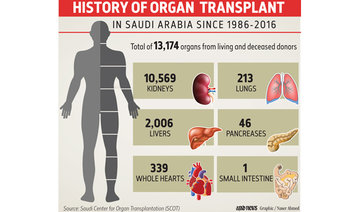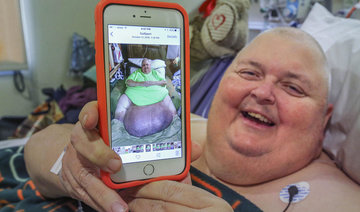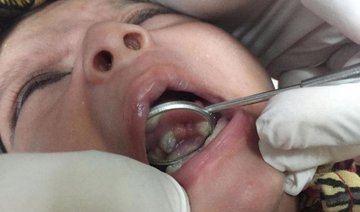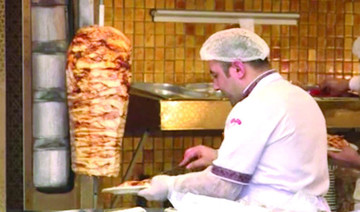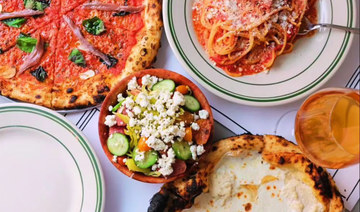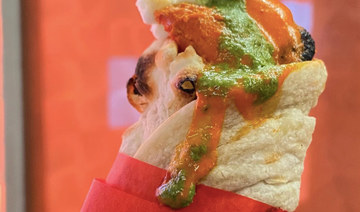BATNA, Algeria: By donating one of her kidneys, Nawel gave her husband Boubaker Ziani a new lease on life after he had undergone 16 years of dialysis.
But in Algeria and across the entire Maghreb in North Africa, many people continue to suffer or die because of the lack of donors.
Part of the problem lies with laws restricting the harvesting of human organs, coupled with cultural or religious reticence, despite Muslim theologians’ approval of organ donations.
Ziani’s wife offered him a kidney after she saw that he had become too weak to play with or even to hold his children.
He had long rejected her willingness to help, but in the end as no other donor was available, he finally relented.
He had the operation at one of Algeria’s two main centers for kidney transplants, the University Hospital in Batna, 435 kilometers (270 miles) east of Algiers.
“I’m like a newborn,” Ziani told AFP, tears in his eyes.
In a consultation room, 47-year-old Abderahmane said he hoped an end to 24 years of dialysis was in sight thanks to a kidney from his mother.
“Dialysis has dominated my life. I want to take a break from this machine and live,” he said.
He suffers from a hereditary condition that also affects two of his brothers. Lacking access to transplants, one of them has died and the other has now been on dialysis for two years.
More than 22,000 people in Algeria suffer from renal conditions and are forced to undergo dialysis, according to the ministry of health. A third are waiting for a transplant.
Many others require liver donations, which can also be offered by live donors.
But under Algerian law, a living person can donate an organ only to a parent, child, sibling or spouse.
In the absence of a national database, the overall number of people awaiting transplants in Algeria is unknown.
Many patients are critically ill as they wait for organs such as a heart which can only be taken from deceased donors.
But the law says organs may only be removed from a dead person if their family agrees.
The overwhelming majority refuse, for lack of information, fear of violating religious laws or mistrust of doctors.
Some also suspect that transplants benefit only the privileged.
“Some families had never heard of donations from corpses before the death of a relative,” said Dr. Ahmed Bougroura, head of the Batna hospital’s kidney health department and coordinator of the transplant team.
Theologian Kamel Chekkat, a member of Algeria’s association of Islamic scholars, stressed that the practice was not religiously outlawed.
“From a religious point of view, there is nothing to oppose organ donation and the taking of organs from corpses,” he said.
He and other Muslim theologians have argued that organ donation after death is “ongoing charity” — a pious act in Islam that outlives the person who performs it.
The gift of an organ fulfils “one of the major objectives of Islamic law, which is the preservation of life,” Chekkat said.
As for the recipient, “whatever the religion of the patient... the law of God instructs us to preserve his life.”
In 2015, just two patients in Algeria — which has a population of more than 40 million — received donor kidneys, according to the Global Observatory on Donation and Transplantation (GODT).
The figures for Morocco and Tunisia were only marginally better, with fewer than 10 patients in each country receiving kidneys from the deceased.
“Organ donation... is struggling to gain a foothold in Morocco, even though there are no prohibitions: not medical, legal or religious,” Moroccan organ registrar Said Sabri told AFP.
Dr. Rafika Bardi, head of the Tunisian Center for the Promotion of Organ Transplantation, said that “as in all the countries of the Maghreb... organ donations by the deceased are minimal.”
She said the region lacked a “culture of donating organs” and that many people confuse organ donation with organ trafficking.
Algeria is considering changing the law to allow citizens to indicate in writing that they accept to have their organs removed in the event of their death, overriding refusals by their families.
However, specialists say that is not enough.
Campaigners in Algeria and Tunisia want to create registers of people who refuse to have their organs taken after their death — and anyone not on the list would be considered a potential donor by default.
Farid Sekouf, 41, who is finally preparing to receive his wife’s kidney after six years on dialysis, believes the public needs more information on the issue.
“When it comes to going to vote, the state does all it can so that even a person in a tent in the Sahara is informed,” he said.
In Algeria, taboos and law deter organ donors
In Algeria, taboos and law deter organ donors
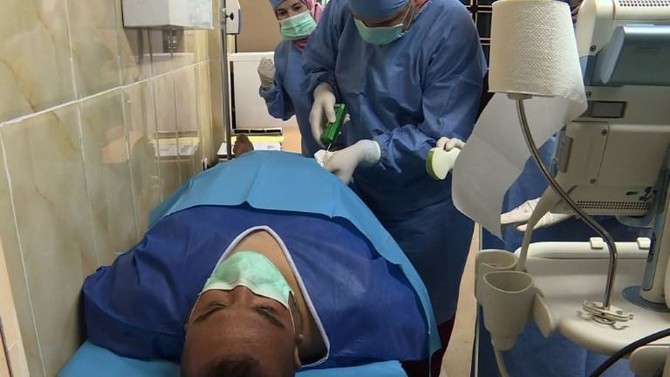
Turkiye applies to have doner kebab protected under EU law
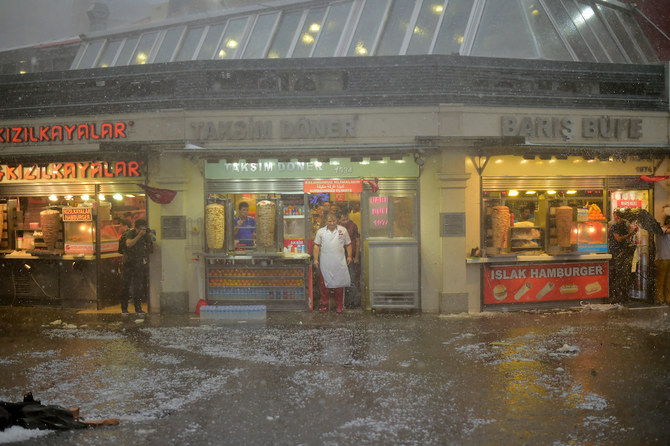
- Meat-based dish could join the likes of Champagne, Serrano ham if approved
- Bloc can apply protections based on heritage value, ingredients, method of production
LONDON: Turkiye has applied to have the doner kebab protected under EU law, Metro newspaper reported.
The bloc famously enforces strict regulations on certain foods — including French Champagne, Spanish Serrano ham and Neapolitan pizza — in order to safeguard their production and preserve regional culinary heritage.
Issues including the sourcing of ingredients, method and place of production all go into determining what can and cannot be labeled as a protected food, with harsh penalties for those found to be profiting from items deemed not to match the legal criteria.
The doner kebab will undergo a three-month evaluation process to determine whether it too will join the exclusive list of dishes and foodstuffs.
During the process, other countries will be permitted to challenge the application over similarities to their own products, as happened in 2021 when Italy voiced opposition to the Croatian sparkling wine Prosek receiving protected status due to its apparent similarities to Prosecco.
Traditionally formed of meat marinated in salt, pepper, a number of other herbs and spices as well as tomato puree and yoghurt, the doner kebab can contain beef, lamb or chicken.
It is placed on a skewer and rotated against a fire, with thin strips sliced off and served in a flatbread or pitta with lettuce, tomato and onion.
Beef and lamb slices should be 3-5 mm in thickness, while chicken should be thinner at 1-3 mm per slice.
The dish is believed to be worth around $3.6 million annually to Europe’s economy, according to the Association of Turkish Doner Producers.
Where We Are Going Today: Sawada cafe in Riyadh
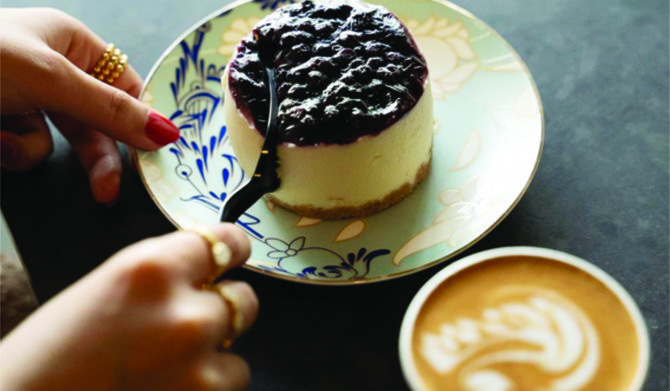
Sawada cafe is located in a plaza overlooking Olaya Street, Riyadh, making it an ideal getaway from the bustle of the city.
The coffee shop offers specialty coffees and desserts, but what sets it apart is its ambiance, with a bohemian-influenced interior design style, soft lighting, and decorative wheat plants lining the walls of the seating area.
Eclectic paintings from Saudi artists are displayed on the walls, providing an artistic touch.

Sawada is ideal for those looking for a quiet and calm spot to relax with friends. It is also good for studying or working — if you can ignore the light, ambient music playing in the background.
Various seating areas are available, including booths bordering the walls and benches overlooking the barista area. A designated smoking area with seating is well separated from nonsmokers sitting indoors.
Customers can also grab their coffees and head to the outdoor seating area or take a walk on the path outside the cafe.
With so many coffee shops and cafes opening in Riyadh, it can be difficult finding authenticity when it comes to coffee beans. But Sawada’s quality is revealed in its V60 drink, a pour-over coffee that highlights the subtle and smooth flavors of the beans.
The menu is standard, with many local favorites, including Spanish latte, flat white, cortado, cappuccino, and tea. Iced tea, an ideal thirst quencher in Riyadh’s summer heat, is also available.
Sawada offers a variety of desserts that can be paired with coffee, including pecan tart, classic date cake, croissants, sweet bars made out of dates, and toffee crumble.
Our recommended options are the chocolate cookies, the classic cheesecake, and the San Sebastian cake. A Snickers and Ferrero Rocher cake also looked appetizing.
We tried the matcha, but the large amount of milk overpowered the flavors of the tea. We recommend trying the signature or Spanish latte instead.
For updates and more information, check Instagram @sawada.ksa.
Where We Are Going Today: ‘Jon & Vinny’s restaurant in Riyadh

- The atmosphere and decoration of the restaurant are standard, with wooden bench-style seating and walls decorated using pizza boxes
Los Angeles-based Italian restaurant Jon & Vinny’s has opened a location in Riyadh serving pizza, pasta, desserts and coffee.
Located in Al-Sulimaniyah, the Italian restaurant has four locations in the US, all in California: Fairfax, Brentwood, Slauson and Beverly Hills.
The Riyadh restaurant features a more casual laid-back dining experience as opposed to other Italian restaurants in the Saudi capital that offer a more refined dining atmosphere.
If you are looking for a luxury restaurant for a quiet date night, this is not the best option, but if you are searching for a trendy hang-out spot, Jon & Vinny’s is suitable for you.
The atmosphere and decoration of the restaurant are standard, with wooden bench-style seating and walls decorated using pizza boxes.
The restaurant founders, Jon Shook and Vinny Dotolo, attended the grand opening in Riyadh on April 17, saying that their mission is to offer authentic food that captures traditional Italian flavors.
The prices on the menu are average, with dishes ranging from SR65-75 ($17-20).
The menu offers a wide variety of pizzas, from “The Rosy,” a tomato and olive oil pizza with parmesan, to the “The Lola,” with fresh burrata, tomato, basil olive oil and a dash of sea salt.
One thing to note is that the pizza is quite authentic compared to other options in the city. The pizza crust is crispy, light and airy, allowing the freshness of the tomatoes and herbs to shine through.
Unlike other Italian restaurants, Jon and Vinny’s also offers different options for crust dips, such as ranch, garlic, buffalo, creamy Italian, pomodoro and olive oil.
In terms of drinks, the options on the menu include juices, soft drinks and caffeinated beverages such as americanos, cappuccinos and other coffee.
You may try the house-made lemonade, which is refreshing but a bit on the sour side. It is definitely great for guests looking for something tangy and refreshing for the Saudi summer heat.
For pasta options, you can try the pesto pasta, known on the menu as the pesto parmigiano oregano. The pasta is perfectly cooked al dente and the sauce is tasty but nothing new or innovative.
The lemon pasta and the spicy fusilli are the two highlight dishes of the restaurant.
When it comes to meat, there are limited choices on the menu. You may try the braised meatballs with ricotta and garlic bread.
The meatballs are very flavorful and seasoned well, with the flavors of the spices in the meatballs complimenting the simple and fresh red sauce.
The garlic bread which is offered with the meatballs is a bit on the charred side.
Another notable option on the menu is the Caesar salad with cheese sticks.
The freshness and quality of the ingredients shine through in the simple dishes.
The restaurant is very trendy and social-media friendly. The wall of Jon and Vinny’s pizza boxes is the perfect backdrop for photos.
Although the restaurant is small, it does offer an open-style kitchen where guests can approach the kitchen area and see the chefs cooking each meal.
For dessert, the restaurant offers a variety of sweets, including cheesecake and chocolate cake.
You will find the staff incredibly friendly.
Jon & Vinny’s offers breakfast, lunch and dinner, and is open from 8 a.m. to midnight.
Renowned London restaurant and Emirati fashion label launch t-shirt collection
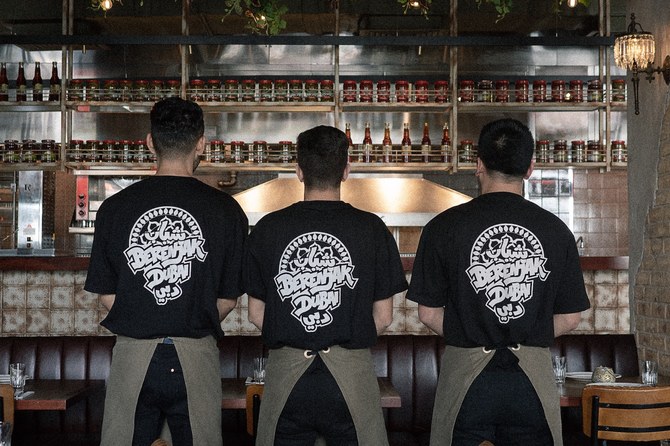
DUBAI: Acclaimed Persian restaurant Berenjak Dubai, hailing from London, has joined forces with Shabab Intl. to launch a range of stylish t-shirts.
In sleek black, the t-shirts – now on sale at the restaurant – feature a Berenjak-inspired print on the back. The logos of both the restaurant and Shabab Intl. are depicted on the front.
Images for the launch campaign were shot by Dubai creative Cheb Moha, who leads the fashion label.

“We’re thrilled to be at Berenjak,” he told Arab News. “Personally, I am a huge fan and make it a point to dine there at least once especially when I’m in London.”
Moha’s deep appreciation for Berenjak stems from an enduring passion for Persian cuisine and cultural heritage, he said.
“Having Shabab there is particularly special for us, and I am confident that it will open doors for more collaborations. With our Shabab community present, it is exciting for them to witness this crossover between our origins and the spaces we inhabit at the restaurant. We are thrilled to stand alongside Berenjak and to have Shabab represented there.”
Moha added his t-shirt designs aimed for simplicity and clarity.

“I wanted to incorporate our identity with Berenjak’s identity and the identity of (the) city we are in, which is Dubai,” he said.
“If you notice, the graphic on the back of the t-shirt is sort of sun shaped. That is part of the Shabab spirit, the sunrise. And if you look in the windows, Berenjak also has a sun motif in the glass. I wanted to incorporate that and feel like there is a nice synergy between both brands.”
Moha also feels there is a crossover between fashion and food. “I feel like there’s always been a pipeline between both. They do complement each other in some way,” he said.
Berenjak, founded by chef Kian Samyani and award-winning London restaurant group JKS Restaurants, is a renowned Persian restaurant that has made its mark by bringing a contemporary twist to classic dishes.
Where We Are Going Today: Kaak Al-Farah

Kaak Al-Farah — which translates as “the cookie of joy” — is an Instagram shop that offers kaak, a traditional date-filled treat enjoyed in Saudi Arabia and other Middle Eastern countries.
A cherished part of celebrations such as Eid Al-Fitr, Eid Al-Adha, weddings and baby showers, kaak are similar to maamoul cookies, which include semolina.
Kaak Al-Farah makes each cookie with care, using ornate molds to shape the date-stuffed dough. After baking, the cookies are packed in a beautiful reusable box.
Made from locally sourced ingredients, including wheat, dates and traditional Saudi flavors such as cardamom and cloves, each bite is a celebration of the region’s rich culinary heritage.
What makes Kaak Al-Farah stand out is not just the delightful taste of the cookies but also the thoughtful packaging which reflects the essence of Saudi culture.
The round box features designs redolent of the joyful spirit found in Saudi communities, including a cheerful ring of colorful flowers symbolizing happiness and beauty and a portrait of a lady representing peace and love. Added to each box is a personalized greeting card.
Kaak Al-Farah delivers to various cities throughout the Kingdom and can be found on delivery apps including The Chefz and Hayak.
For more information, visit their Instagram profile — @kaak.alfarah.


